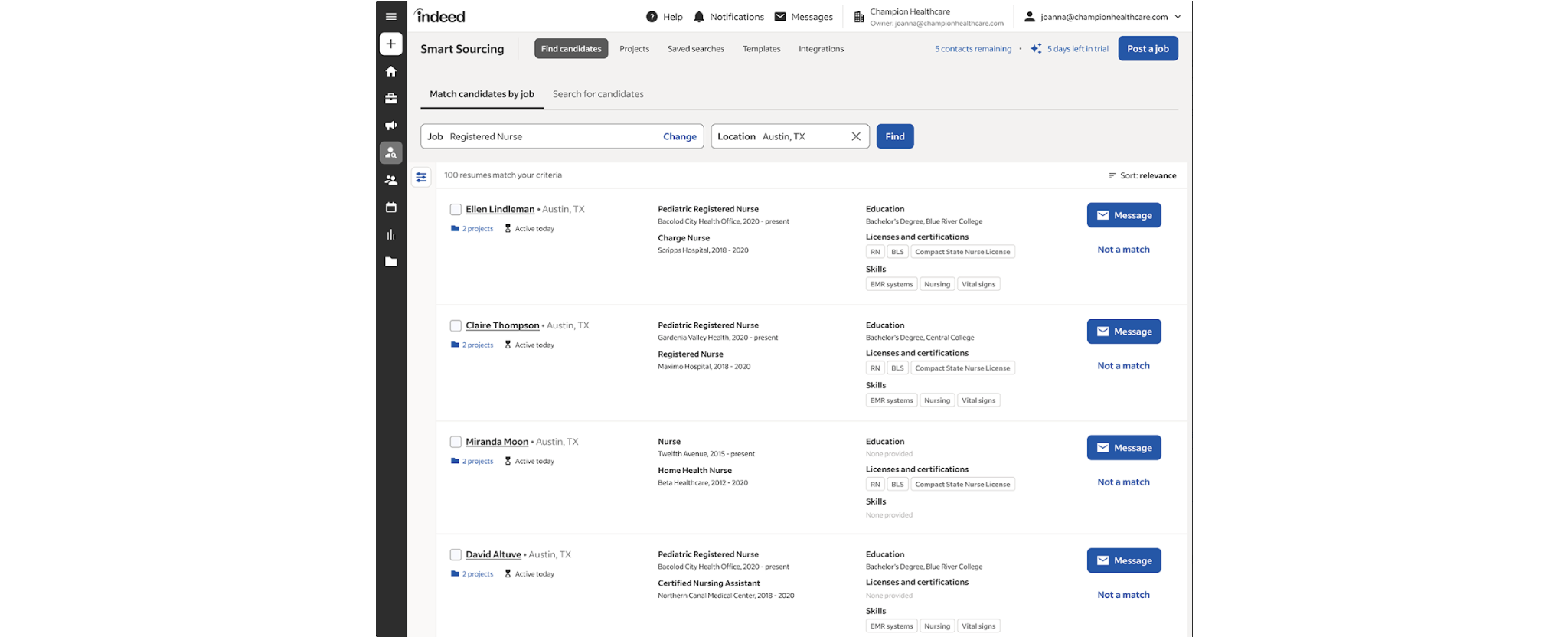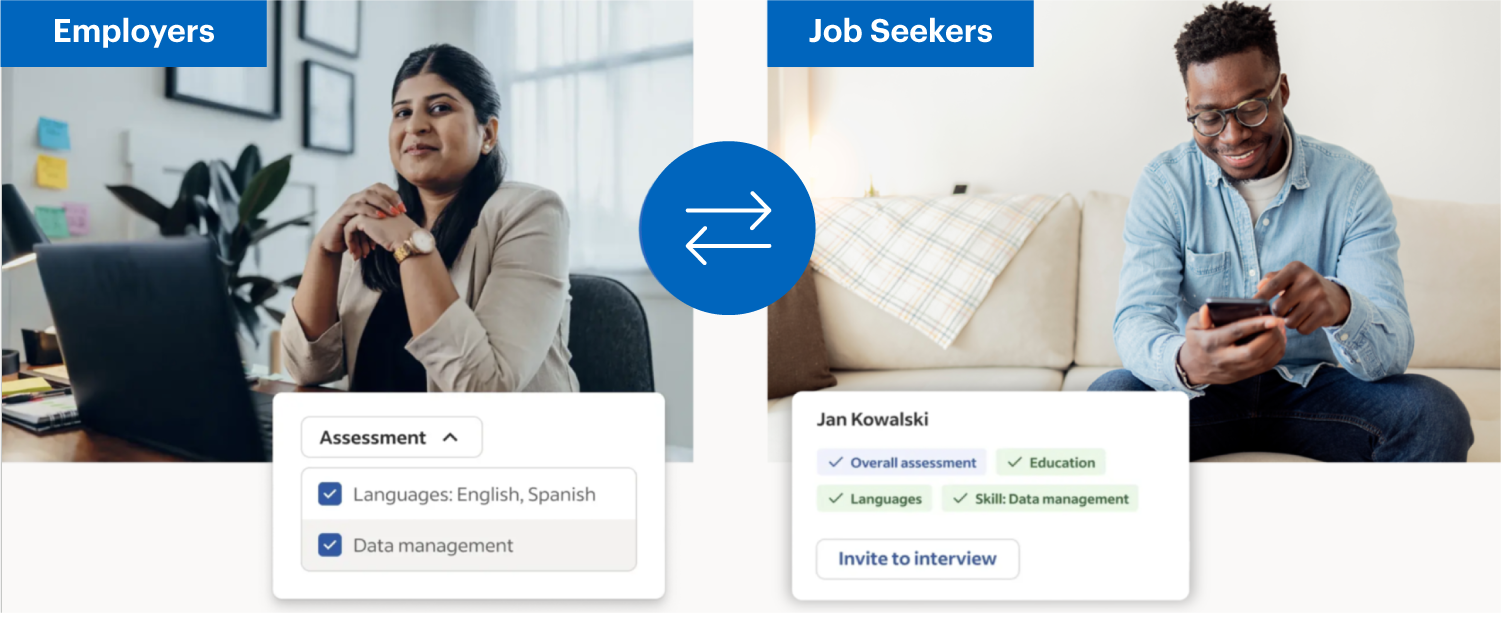
Sustainability
Reducing the Time to Get Hired by Half
Commitment to Society

Reduce the time it takes to get hired by half by FY2030 compared to that of FY2021*2

We have been working to get closer to the hire by helping job seekers and employers through every step of the process. With the power of our hiring platform, job seekers are able to search for a job, apply for a job, have an interview, and get hired faster and simpler than ever before. What’s more is through the combination of rich data and product advancement, we are improving the quality of job matching, too.

Advancement in Measurement Methodology
Establishing Job Search Duration Measurement
“When does a job search begin and when does it end?” To date, there has not been an established measurement method available to capture exactly how long it takes for job seekers to get jobs on a job platform. Therefore, our journey started by developing a methodology to enable us to answer this question. Since we launched this goal in May 2021, we started a phased strategy to advance our measurement methodology.
We had a measurement logic in place that shed light on when a job search ended (what we call “hired signal”), but we did not have a way to know and measure when a job search starts. To calculate the overall search duration from when a job search starts to when a person is hired, we began gathering self-reported data on job search duration directly from job seekers who found their jobs on Indeed ― this data formed the basis for our methodology. In May 2021, we shared that it takes approximately 15 weeks for most people to get jobs on Indeed.*3 In the long term, we are evolving our measurement methodology to identify the start of job search from actions on the platform to measure the time it takes to get hired more easily.
Learn more about job seekers’ self-reported data
Employer “Time-to-Hire"*4
In pursuit of our long-term goal to halve the time it takes to get hired, we need to understand the process of both the job seeker and employer. In FY2023, we focused on the "Time-to-Hire" for employers, a metric that can be measured at each step of the hiring process, up to and including the hire, based on Indeed data. As shown in the diagram below, many of the steps that job seekers follow in the job search process parallel those that employers follow in the candidate search process, and employers' actions significantly impact the time it takes to get hired.
The Hiring Process of Job Seekers and Employers

We measure the time it takes for an employer to hire by using the date that the job was created on Indeed as the start point, and the date that a successful hire was made as the end point. Each step of this process can be measured on Indeed.
Based on data collected on Indeed for jobs that led to a hire, the average time to hire is around 55 days.*5
Average Employer Time to Hire

Simplifying and Speeding Up Hiring with Platform Evolution
We are beginning to see signs of reduced "Time-to-Hire" on Indeed through improved matching, reduced friction, and process automation.
Matched Candidates*6
Indeed's "Matched Candidates" feature uses Indeed’s matching AI to provide a list of qualified candidates to employers using a combination of data found in resumes, job seeker profiles, and the details provided in the job posting. Employers can then send candidates a personalized invitation to connect.
As a result, out of the job seekers who responded to the invitations, more than half did so in less than 5 hours.*7 Based on this success, since April 2024, the Matched Candidates feature became available to a wider pool of business clients by being included in subscriptions of Smart Sourcing, a product enabling faster matching and a cohesive hiring experience. Employers can connect with job seekers before they apply for the job through this feature.


Indeed Assessments
Indeed Assessments helps job seekers to display their skills and helps employers find quality candidates who they want to contact for an interview by providing multiple ready-to-use skill tests. We observed that Indeed Assessments reduced time to hire for employers by an average of 17% compared to job postings where employers did not use this product.*8

Our Journey Toward 2030
We will continue to deepen our knowledge about the time it takes for job seekers to get a job and for employers to make a hire, further develop products to shorten job search duration while advancing measurement methodologies to help create a world where opportunities for life are available to all.

Breaking Down Job Market Bias & Barriers to Help 30M Job Seekers Get Hired
- On this webpage, the number of years stated are reflective of the number of Recruit Holdings fiscal years, which begin on April 1 each year and end March 31 of the following year. All figures displayed here are approximate.
- The period from the time a user starts an active job search on the Indeed job platform to the time the user confirms receipt of a job offer.
- Baseline job search duration calculated as of March 31, 2022. Calculated as the period from the time users started an active job search on the Indeed job platform to the time that 90% of such users had received a job offer (assuming for this purpose that the period it takes for 90% of users to receive a job offer represents a statistically significant value). The job search duration is calculated based on surveyed user data collected between September 2021 and March 2022.
- An employer metric defined as the days elapsed between when a job is created on Indeed and when the first hire is reported for that job. There is no change in our goal of “reducing the time it takes to get hired by half" by FY2030. The Company decided to accelerate its product advancement by identifying challenges in the process of hiring by using employer action data “Time to Hire” which can be measured on Indeed.
- 55 days is the mean time to hire (starts from a job creation and ends with the first hire) for measured hires on Indeed in December 2023. The calculation excludes a small portion of hires (approximately 1% of the all measured data) with durations greater than 720 days, which are a result of data collection anomalies, rather than true time to hire durations.
- The Matched Candidates feature automates sourcing. In FY2023, Matched Candidates was available to employers who sponsored a job; in FY2024, Matched Candidates will be part of the integrated Smart Sourcing product. In FY2023, Matched Candidates was available in U.S., U.K., and Canada (English only).
- Data from April, 2023 - March, 2024, based on data from U.S., U.K., and Canada (English only) where Matched Candidates was available.
- For hosted jobs on Indeed that made hires between October 1 and December 31, 2023, in countries where Indeed Assessments are offered (US, UK, CA, FR, IN, BR, MX, AE, PH, ZA). Analysis revealed a statistically significant difference in the number of days for an employer to make a hire on Indeed between jobs that used Indeed Assessments and those that did not. Time to hire was defined as the period from the day the job was created on Indeed to the day that the employer made a hire.
